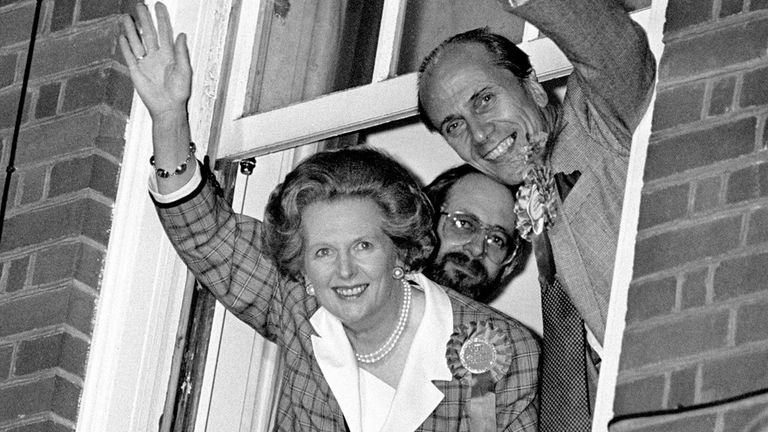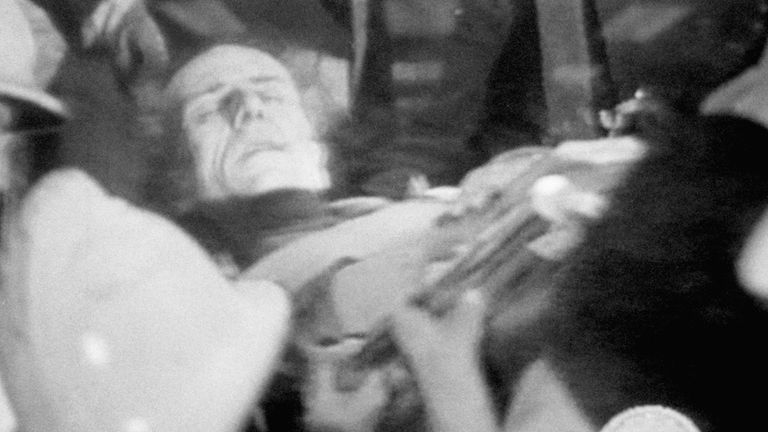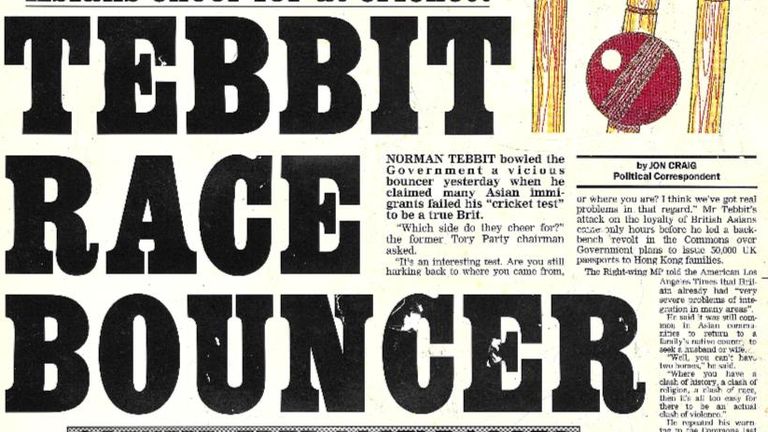Norman Tebbit was one of Margaret Thatcher’s true believers and one of her most loyal allies.
In a Conservative party full of old Etonians and toffs, he was also one of very few cabinet ministers from a working-class background.
Politics latest: UK and France will get ‘tangible results’ on migration, President Macron says
He once told me, when he was party chairman in the mid-1980s and I was working for The Sunday Times, about the snobbery in the party.
“They think I eat peas off my knife,” he said. I think he was joking.
He revelled in his reputation as a working-class bruiser. Labour’s Michael Foot called him a “semi house-trained pole cat” and he was widely known as “The Chingford Skinhead”.
During the riots of 1981, he famously spoke of his father being unemployed in the 1930s. “He didn’t riot,” he said. “He got on his bike and looked for work.”
I’ve been reporting at Westminster since 1982 and covered the Thatcher era when Norman Tebbit was a giant on the political stage throughout.
When I started as a political journalist he had just been promoted to the cabinet in Mrs Thatcher’s momentous reshuffle late in 1981.
That was the reshuffle in which Mrs Thatcher purged the so-called “wets” in her cabinet and appointed true believers like Tebbit, Cecil Parkinson and Nigel Lawson.
Like many incoming governments, hers had struggled in the early days, though perhaps not as badly as Sir Keir Starmer’s is at the moment! In the early ’80s, though, inflation and unemployment were both rampant.
Even after the 1978-79 “winter of discontent” that brought down James Callaghan’s Labour government, strikes were still crippling industry. Mrs Thatcher decided radical action was necessary.
So she handed Tebbit the job of employment secretary: his job was to tame the power of the trade unions.
He succeeded one of the cabinet “wets”, the moderate James Prior, who had been branded “Pussyfoot Prior” by Tory-supporting newspapers over his perceived failure to take on the unions.
He was exiled to Northern Ireland in the 1981 reshuffle. Parkinson became a charismatic party chairman and Lawson became energy secretary and later succeeded Sir Geoffrey Howe as chancellor.
Tebbit had always been very anti-trade union, going back to his first job in the printing room of the Financial Times, where he had been forced to join a union, and then his days as a British Airways pilot.
So as employment secretary, he introduced tough anti-trade union legislation, including outlawing the closed shop and making strike ballots compulsory.
And, as Mrs Thatcher turned round the fortunes of her government following the 1982 Falklands War, he became one of the most senior members of the cabinet, and one of her most dependable allies.
After the 1983 Tory landslide, she promoted him to trade and industry secretary, after Parkinson quit in a sex scandal after fathering a love child.
But just as Tebbit was becoming one of the giants of the Thatcher government and being talked about as a potential successor as PM, his political career was cut short by the 1984 IRA attack on the Grand Hotel in Brighton.
It was to be the defining moment of his career. Who can forget the images of him being rescued after he was trapped in the rubble?
He was badly injured, spent three months in hospital and his wife Margaret was paralysed and spent the rest of her life in a wheelchair.
Read more:
Public finances in ‘relatively vulnerable position’, OBR warns
Nine charts that tell us whether Labour’s first year has been a success or failure
Some political observers claimed he was never quite the same after his injuries and the sorrow and anger about his wife’s condition.
I don’t think he lost any of his edge, however. He was still a great political campaigner and a bruiser.
During the 1987 election, there was tension between Tebbit and Lord Young, another Thatcher favourite, over election strategy, although despite a “wobbly Thursday” during the campaign the Tories won handsomely again.
My other personal memory of Lord Tebbit is breaking the story in the UK about his “cricket test” remarks about Asian supporters, in an interview with the Los Angeles Times in April 1990.
He spoke about a test of how English someone from an ethnic minority background was by asking which cricket team they supported.
“Which side do they cheer for?” he declared. “It’s an interesting question.”
The headline on my story on the front page of the late – and some would say unlamented – Today newspaper was “Tebbit race bouncer. The ultimate test for being British: Which side do the Asians cheer for at cricket?”
He was strongly criticised for his remarks, not just by political opponents, but also by Conservative MPs.
But Lord Tebbit was controversial right throughout his career. A divisive figure, he was adored by the Tory Right but loathed by the left and trade unions.
But what’s not disputed is that he was a massive figure in the Thatcher years.








